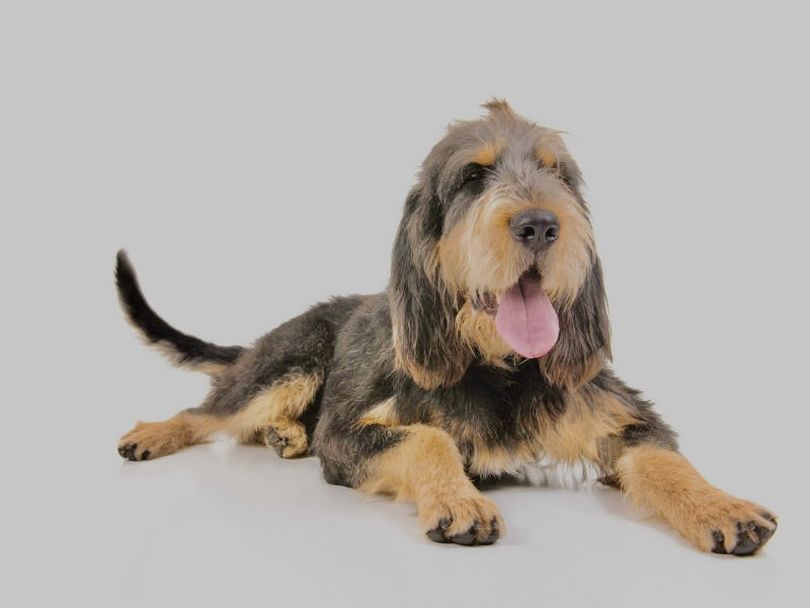Dog Breed
Otterhound

- Full Name
- Otterhound
- Your PupScore
- Take the best dog breed quiz to get your Pup Scores!
- Life Span
- 10 - 15 years
- Weight
- 65 - 125 pounds
- Description
Boisterous, Amiable, Even Tempered
- Origin
- United KingdomEngland
- Family Considerations
- Overall Ease of Breed
- Personality
- Home and Environment Considerations
- Physical Characteristics
Child Friendly
5/5
Is the Otterhound good with children?
Yes! The Otterhound is naturally friendly with children. As always, socialization is always important, but the Otterhound is an excellent dog for anyone with small children.
Stranger Friendly
4/5
Is the Otterhound friendly with strangers?
Yes, the Otterhound is very friendly with strangers. We still recommend early socialization while the Otterhound is a puppy to introduce them to various new people, but in general they are friendly with everyone.
Dog Friendly
4/5
Is the Otterhound friendly with other dogs?
Yes, the Otterhound is very friendly with other dogs. We still recommend early socialization while the Otterhound is a puppy to introduce them to various new dogs, but in general they are friendly with dogs as soon as they meet them.
Likes to Cuddle
3/5
Does the Otterhound like to cuddle?
The Otterhound likes to cuddle up every once in a while. They appreciate physical affection, but probably won't stay in your lap for extended amounts of time.
Playfulness
4/5
Does the Otterhound like to play?
The Otterhound will almost always be ready for play! The Otterhound is great for a family with children, or otherwise, an environment that is always ready for play.
Service Dog Ability
3/5
Does the Otterhound make a good service dog?
The Otterhound is not typically used as a service dog. There are always exceptions to the rule, but a service dog has to have many natural traits in addition to the proper training- smart, patient, and obsessed with pleasing their owner.
Ease for Novice
2/5
Is the Otterhound good for first-time owners?
The Otterhound would not be the best fit for first-time owners. A breed is only good for first-time owners if it is raised for home companionship, and is open to training and is motivated to please its owner.
Training Potential
2/5
How well can the Otterhound be trained?
The Otterhound does not have high levels of training potential. There are exceptions, but the Otterhound is not typically seen in competitions or as a service dog or police dog.
Amount of Shedding
2/5
Does the Otterhound shed a lot?
The Otterhound does shed, but less than average.
Ease of Grooming
4/5
Is the Otterhound easy to groom?
The Otterhound requires some grooming, but less than the average dog breed. Typically you will not need to take the Otterhound to the pet salon, and occasional combing at home should be enough.
Exercise Need
3/5
Does the Otterhound need a lot of exercise?
The Otterhound requires an average amount of exercise. You should be ready to dedicate a couple of short walks or a larger dog park session each day for your Otterhound to be happy and fulfilled.
Intelligence
3/5
How smart is the Otterhound?
The Otterhound has average intelligence. They are smart and witty, but do not need to be constantly challenged mentally, as some other breeds.
Amount of Barking
5/5
How much does the Otterhound bark? Does the Otterhound bark too much?
The Otterhound barks all the time. They are big talkers, and want to show it! In general, barking and being expressive can be beneficial, such as for guarding property or livestock. But it is important to consider whether heavy barking suites your lifestyle.
Guard Dog Ability
4/5
Is the Otterhound a good guard dog?
The Otterhound is not a dog breed necessarily known as a guard dog, but they are alert. The Otterhound is protective of its family, and has above average tendencies when it comes to guarding property.
Tolerates Being Alone
3/5
Is the Otterhound good at staying alone? Is the Otterhound independent?
The Otterhound does not enjoy being left alone for extended periods. They can do well for a couple of hours alone, but may have anxiety for time beyond that.
Good for Apartment Living
3/5
Is the Otterhound a good apartment dog?
The Otterhound is not the best dog apartment living, but it can work if the owner is dedicated to exercising and training their Otterhound
Size
3/5
How big is the Otterhound?
The Otterhound is a medium sized dog breed. They can range in size depending on genetics, and males are larger on average than females.
Tolerates Heat
3/5
How much does the Otterhound tolerate hot weather? When is it too hot for a Otterhound?
The Otterhound can tolerate some heat, but should not be over-exposed to hot weather. In general, they can live in hot weather climates, but would do best with air conditioning or at least a fan in their home, especially where they sleep.
Tolerates Cold
3/5
How much does the Otterhound tolerate cold weather? When is it too cold for a Otterhound?
The Otterhound can tolerate some cold, but should not be over-exposed to cold weather. In general, they can live in cold weather climates, but may need clothing on particularly cold evenings or in snow.
Potential to Run Away
5/5
Does the Otterhound try to run away?
The Otterhound has huge wanderlust, meaning that it's natural for them to want to run away. They are known as escape artists. It's important to test your yard and have a tall fence that cannot be jumped or climbed over. Sometimes the Otterhound is not well suited for being off-leash, even if they are well trained.
General Health
3/5
Is the Otterhound a healthy dog? The health of a Otterhound should be measured not just by how many years they live, but also by how many health issues they've had. It is important to know which health conditions your breed is prone to- hip problems, eye problems, bloating, and arthritis are all common dog health problems.
The Otterhound is healthy, but has an average number of health risks that should be taken into consideration.
Energy Level
3/5
How energetic is the Otterhound?
The Otterhound has a good amount of energy and it's important to give the Otterhound daily walks and ideally run time as well. A well-exercised dog is easier to train, and will be happier and have less likelihood for destructive habits.
Amount of Drooling
4/5
How much does the Otterhound drool?
The Otterhound drools a decent amount, especially if that irresistible food is nearby.
Prey Drive
4/5
Does the Otterhound have a large prey drive? Does the Otterhound like to chase birds, cats, and other small animals?
The Otterhound has a high prey drive and has a natural tendency to chase after any small animal. Every case is unique, but the Otterhound may not be the best dog for living with other cats or small animals.
Athleticism
3/5
Is the Otterhound atheltic?
The Otterhound is athletic and has average levels of endurance. They need a lot of exercise, and can be an exercise partner as long as it's nothing too extreme.
 Dog
Dog- Hound
- Otterhound
The Otterhound is a purebred dog that falls within the larger Hound dog breed group.
Hound group: The hound has traditionally been used alongside hunters to track or chase prey. Unlike retrievers who are bred primarily to retrieve and bring back the prey, hounds were typically bred to have excellent vision, scent, or speed to pursue the prey.
Because of the Hound's excellent vision, scent, and focus, they are a common police and secret services dog. Hounds are typically categorized into either "scent hounds" or "sight hounds".
Both exercise and mental stimulation is important for hounds because of their history. They want to feel they have a "job" and want to go to bed feeling they have done their day's duty.
Otterhounds for adoption
Similar Breeds


